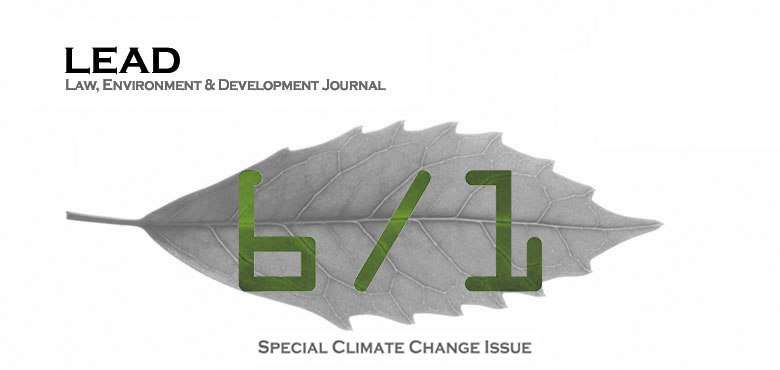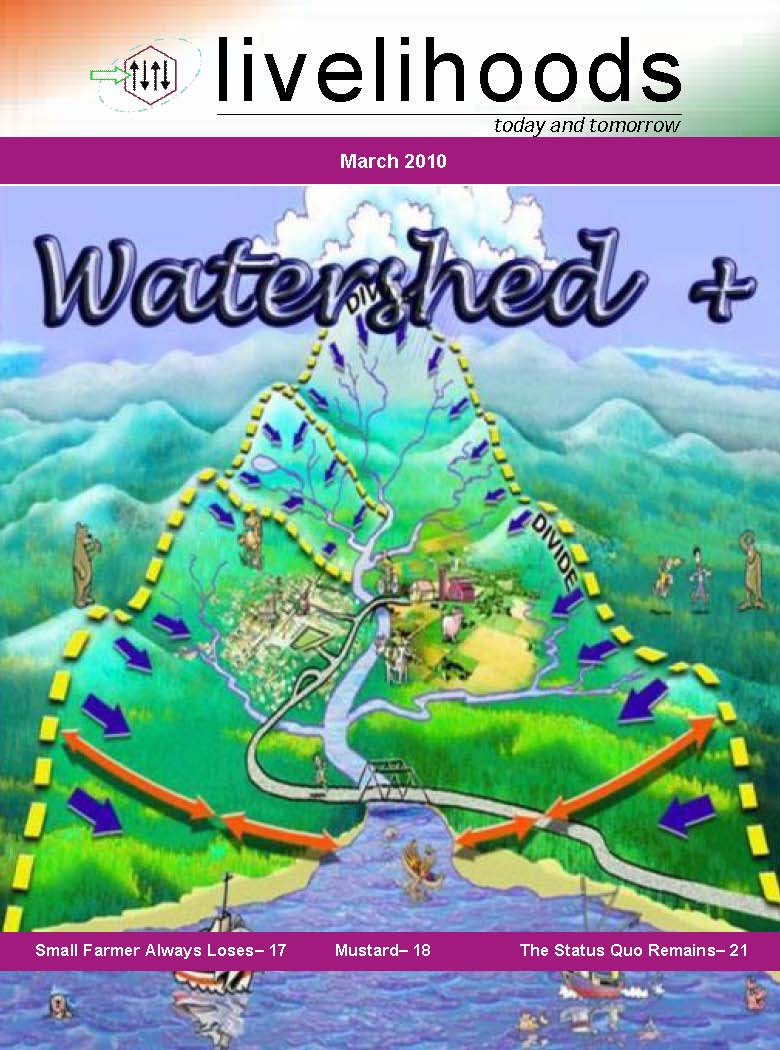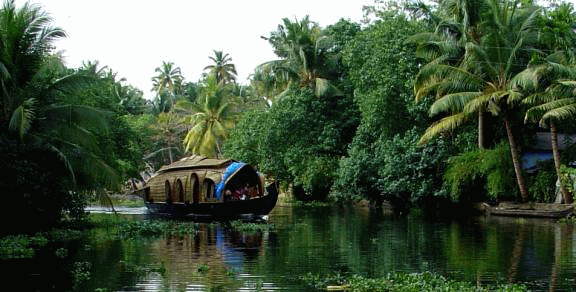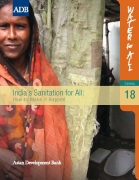News and Articles
LEAD journal special issue on climate change
Posted on 07 Jun, 2010 08:33 AM The Law, Environment and Development Journal published by School of Oriental and African Studies and International Environmental Law Research Centre, has brought out a special issue on Climate Change.
The Law, Environment and Development Journal published by School of Oriental and African Studies and International Environmental Law Research Centre, has brought out a special issue on Climate Change.
Livelihoods magazine special issue on watersheds
Posted on 07 Jun, 2010 08:14 AM A special issue of the Livelihoods magazine (March 2010) brought out by the Akshara Network for Development Support Services, on Watersheds+.
A special issue of the Livelihoods magazine (March 2010) brought out by the Akshara Network for Development Support Services, on Watersheds+.
Increasing productivity of dry lands is possible through soil and moisture conservation (SMC) efforts results in growth led by increases in the farm output. Separate efforts are required to include the land-less and the vulnerable in this growth, so that they also realize the benefits of improved food security, increased employment and diversification of livelihoods. Such activities are known as ‘Watershed Plus’ interventions, and ‘livelihoods’ explores these activities.
Community initiative for efficient management of rural water supply in Assam
Posted on 06 Jun, 2010 10:18 PMDrinking Water Supply in rural areas of Assam ( India ) is managed by the Public Health Engineering Department (PHED), Government of Assam and the challenge is indeed enormous and achieving the targets requires well planned and strongly determined strategies and approach. Government has already formulated the necessary strategy to ensure sustained supply of safe drinking water in rural areas. However for achieving the desired end results from the Government initiatives, the community needs to be mobilized to own and sustain these programmes and to become an active partner in their implementation. For such a participatory demand driven approach, necessary awareness generation amongst the Community to realize the need for “total water security” and its impact on reduction of water borne diseases, is highly warranted.
National Water Mission under National Action Plan on Climate Change: Revised Comprehensive Mission Documents - Ministry of Water Resources (2009)
Posted on 05 Jun, 2010 11:46 PMThe National Water Mission (NWM), under the aegis of the Ministry of Water Resources, is one of the eight missions being constituted under the National Action Plan for Climate Change (NAPCC). The NAPCC was launched by the Prime Minister in 2009 as a nation-wide effort to tackle climate change.
Urban Development Policy 2009 - Department of Urban Development (Government of Karnataka)
Posted on 05 Jun, 2010 04:20 PMThe Urban Development Policy, Karnataka has been developed, by the Department of Urban Development (Government of Karnataka), as a response to the challenges that are being faced by the state due to rapid urbanisation leading to:
- An increase in population in urban areas due to migration
- Increase in the number of poor residents in urban areas
- Infrastructural shortfall on several fronts
- Shortage of resources
- The challenge of ensuring the basic welfare of the poor in urban areas
- The increasing need for strengthening governance, planning and administration
Vembanad Fish Count - Report of the Participatory Fish Resources Surveys of Vembanad Lake (Kerala) done in 2008 and 2009 by ATREE
Posted on 03 Jun, 2010 06:23 PM The Vembanad estuarine system, the largest of its kind on the west coast of India is known to be abundantly enriched with diverse fishery resources, providing feeding, spawning and rearing areas for a very large proportion of commercial (fin) fish and shellfish. However, ecosystem health of the Vembanad wetlands is alarmingly declining due to a variety of reasons - obstruction of river courses, sand mining & habitat destruction, loss of riparian canopy cover, encroachment, pollution and unethical fishing practices. Reduced summer flow due to drying up of rivers and pollution hazards from agro-chemicals and sewage also lead to mass mortality of fishes. Depletion of fishery resources has changed this ‘inland fish basket’ to an ‘inland wastebasket’, driving the fisherfolk, the primary stakeholders of the lake into a livelihood crisis.
The Vembanad estuarine system, the largest of its kind on the west coast of India is known to be abundantly enriched with diverse fishery resources, providing feeding, spawning and rearing areas for a very large proportion of commercial (fin) fish and shellfish. However, ecosystem health of the Vembanad wetlands is alarmingly declining due to a variety of reasons - obstruction of river courses, sand mining & habitat destruction, loss of riparian canopy cover, encroachment, pollution and unethical fishing practices. Reduced summer flow due to drying up of rivers and pollution hazards from agro-chemicals and sewage also lead to mass mortality of fishes. Depletion of fishery resources has changed this ‘inland fish basket’ to an ‘inland wastebasket’, driving the fisherfolk, the primary stakeholders of the lake into a livelihood crisis.
IEC in Jalswarajya Project (Maharashtra) - A guiding light for water supply sector
Posted on 01 Jun, 2010 11:51 PMIEC in Jalswarjya- A guiding light for WSSD, Govt. of Maharashtra
- An article based on vibrant experience of Jalswarajya Project
Prabhakar S. Mishra
IEC specialist, Nagpur
Introduction
Whenever we are working on development front we need to put communication at heart place. Worldwide past experience suggest that modernization approach of development communication fail to sustain impact on stakeholders due to its vertical one way format based on prejudice which fix responsibility of being backward on under develop class. Till end of 20th century mostly communication in development sector was argument and advocacy based. Also efforts initiated with expectation of switch effect behavioral change, that outcast trust from communication.
Round up of the water news for the week ending 31st May 2010 : Six sewage treatment plants coming up in tsunami-affected areas of Nagapattinam, TN
Posted on 31 May, 2010 10:31 PMSome recent news items from the news feed that India Water Portal maintains at Newsrack: (http://newsrack.in/stories/arghyam/Water/55) :
- Six sewage treatment plants coming up in tsunami-affected areas of Nagapattinam, TN : https://www.thehindu.com/2010/05/31/stories/2010053157650600.htm
The power of uncertainty: Reflections on the nature of transformational initiatives - Malcolm Adiseshiah Centenary Lecture by Mihir Shah
Posted on 26 May, 2010 11:21 PMIn this lecture, the author makes connections between the concepts of certainty and uncertainty and draws parallels between these and the scientific or the positivist approach and the phenomenalist approach. The author argues that the excessive emphasis on certainty, which is an inherent assumption of the scientific approach embraces reductionism, compartmentalisation and has been the principle underlying all disciplines such as developmental economics.
India's Sanitation for All: How to make it happen - An ADB report
Posted on 26 May, 2010 11:02 AM This discussion paper by ADB, examines the current state of sanitation in India in the context of the Millennium Developmental Goals, which call for a 50% reduction in the proportion of people without sanitation by 2015 and India's goal of providing Sanitation for All by the 2012.
This discussion paper by ADB, examines the current state of sanitation in India in the context of the Millennium Developmental Goals, which call for a 50% reduction in the proportion of people without sanitation by 2015 and India's goal of providing Sanitation for All by the 2012.
The paper targets policy makers, governmental ministries, state and local governments, non-governmental organisations, developmental agencies and all those who are involved in the planning and implementation of sanitation policies in India. It makes a few recommendations for the successful implementation of sanitation efforts in India.The focus of these recommendations is on household sanitation, which includes safe disposal of human excreta, as measured by household ownership of a sanitary latrine and household access to drainage facilities.